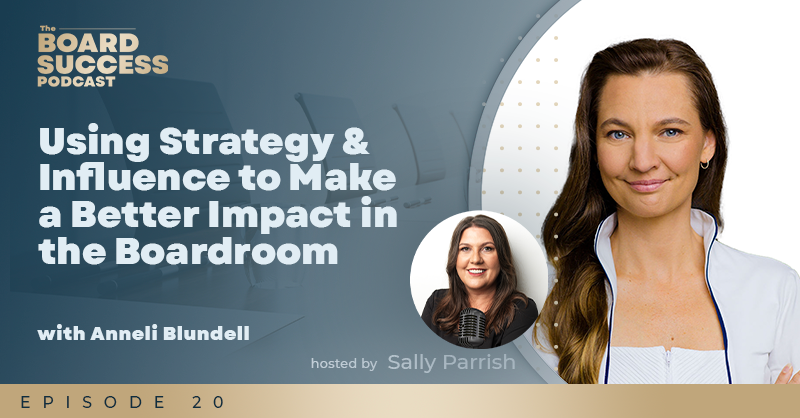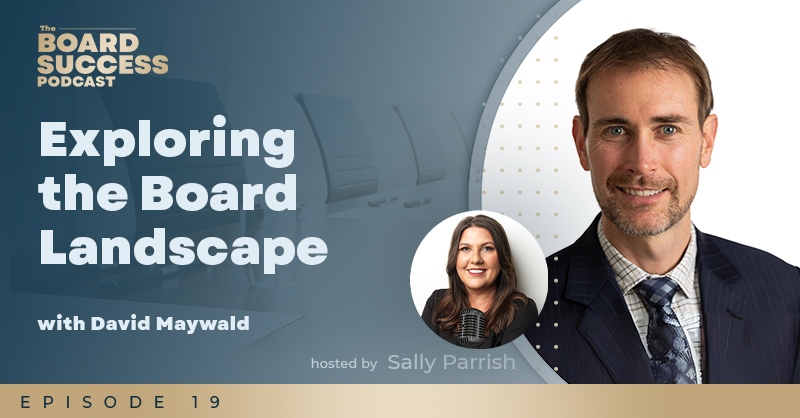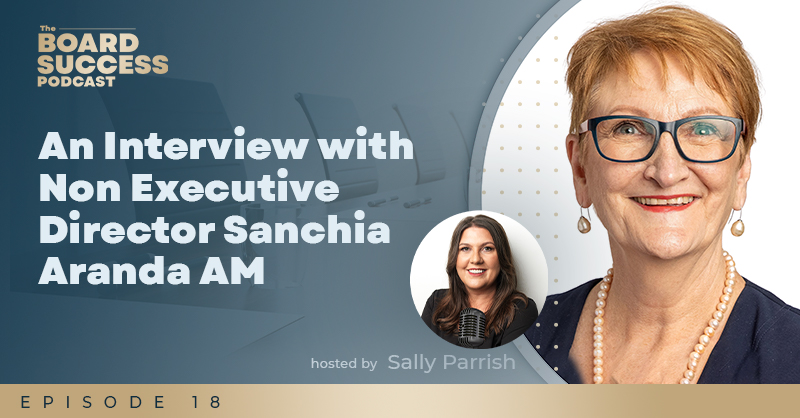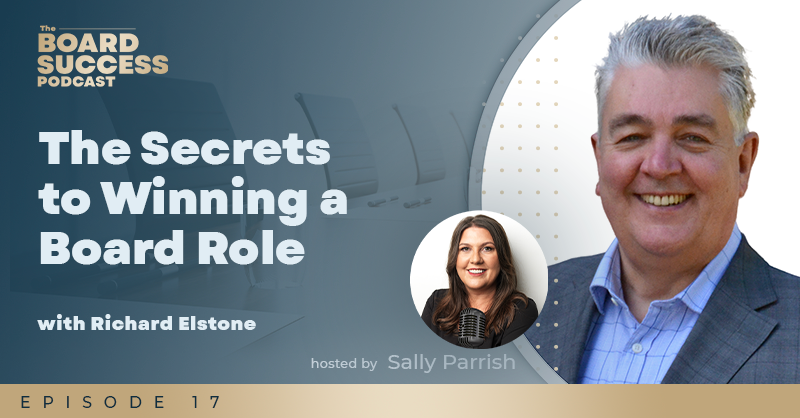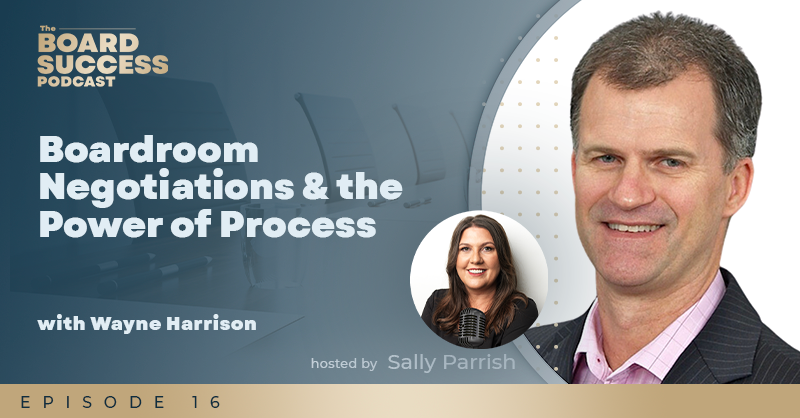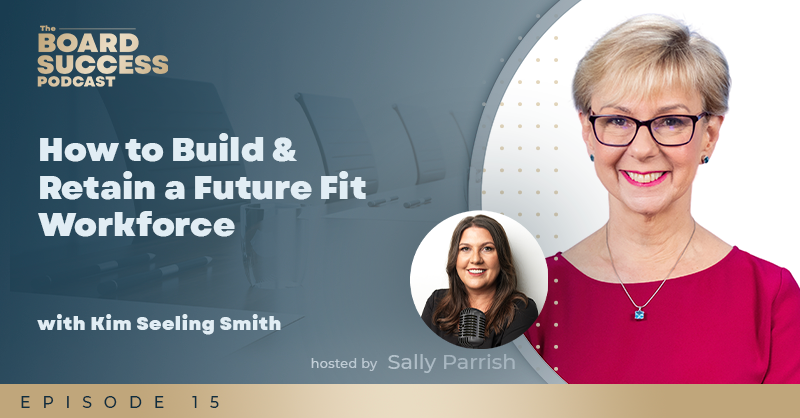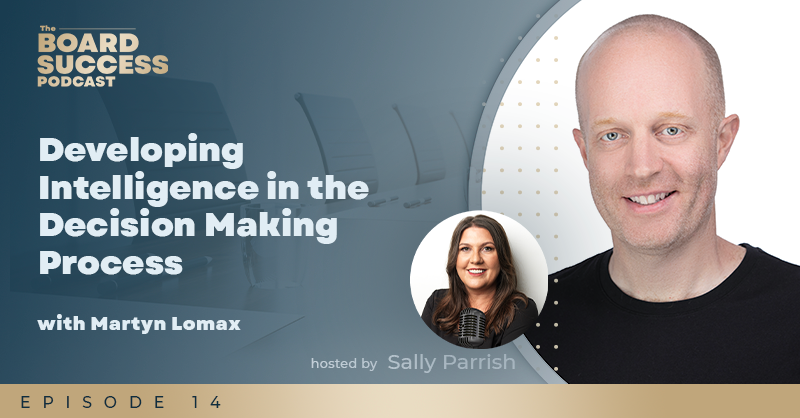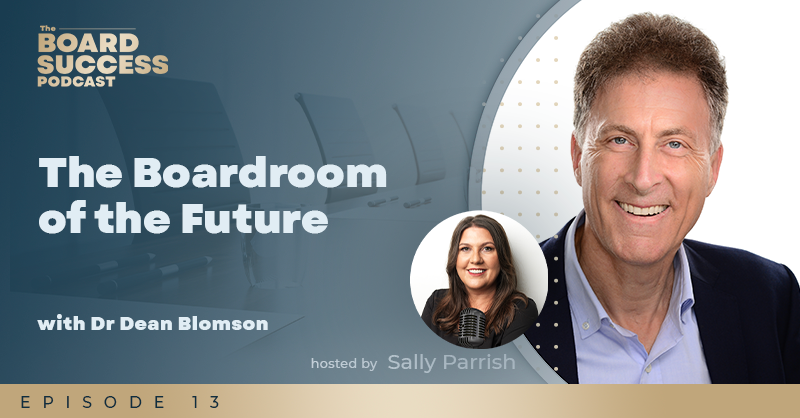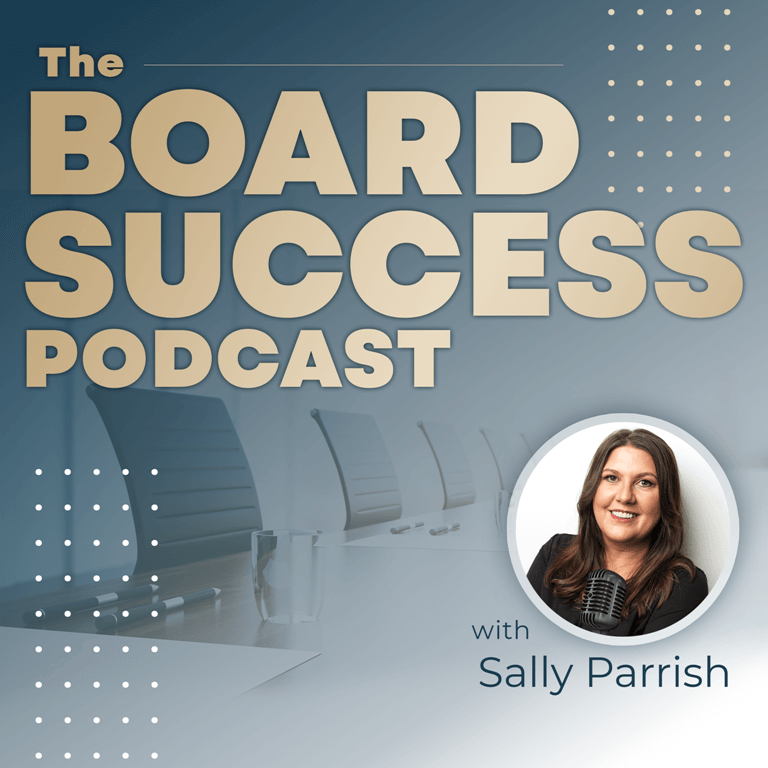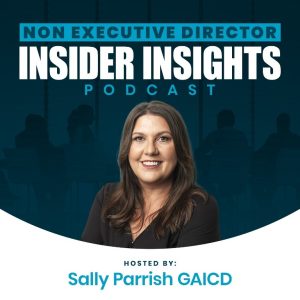Building Board Trust
Sally Parrish interviews Mags Bell
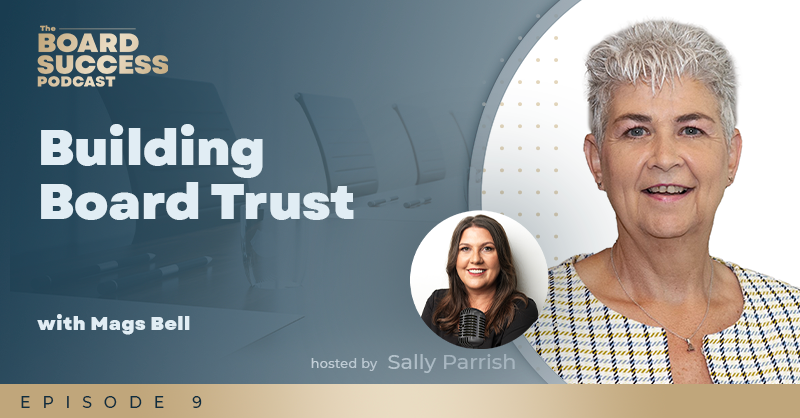
In this episode Coach Mags Bell discusses the role our values play in the boardroom and the importance of ensuring our values are in alignment with other Non Executive Directors in the business.
Mags is an international speaker, author and awareness expert, who works with major influencers and leaders around the world, to Cut, Polish and Reset their inner diamonds allowing them to step up into LeadingME®. Leaders are followed! We need to focus on our own behaviour as leaders, this is where respect and trust of our people comes from. Trust is a very big issue in today’s business world, as shown by published articles in Harvard, Forbes and many other researcher papers.
For too long we have been focused on how to lead others, when others will only be led by those they have confidence in, trust in, believe in and feel fairly treated by.
FURTHER INFORMATION
Click here to download the Masterclass referenced in this podcast; "Silencing Your Inner Critic"
Website: Creating Powerful Results
Facebook: http://bit.ly/ConnectWithMagsOnFacebook
Instagram: https://bit.ly/ConnectWithMagsOnInsta
LinkedIn: http://bit.ly/ConnectWithMagsOnLinkedIn
Twitter: http://bit.ly/ConnectWithMagsOnTwitter
Listen to Mags’ Podcast: http://bit.ly/LeadingMEPodcast
Youtube: https://bit.ly/ConnectWithMagsLeadingMEYouTube
Click Here to View the Podcast Interview Transcript with Mags Bell
Sally Parrish 01:29
Our guest today is Mags Bell, who's the founder of Creating Powerful Results. And today she's joining us from her home in the Gold Coast to talk all about trust in the boardroom. Mags has over 25 years in business and has amassed more than 60,000 hours coaching leaders and influencers to grow their lives and businesses through the power of clarity,using her framework called the new paradigm of leadership LeadingMe™. Today we're talking about how to build trust with others, to allow them to follow and engage easily with what we're aiming to achieve. Welcome, Mags, it's great to have you here.
Mags Bell 02:11
Thanks for having me, Sally.
Sally Parrish 02:13
Now, Mags you have a massive body of work, you've done some deep research, I know you've been studying and researching leadership and human behavior now for over three decades. And there's a huge body of work that you have around this. So out of all the topics that you could have brought to us today. What is it about ‘trust’?
Mags Bell 02:33
Well, you make me sound really old when you say the three decades. And every time I see or hear someone say I go oh, my god, isn't that long? Yeah, I think when I started as a manager, myself, I had a badge, I wore a badge. And sometimes in the boardroom, that you know, getting your first board role is like getting a badge. So then you've got things like imposter syndrome comes in, you're not sure what you're doing. And then when you have two or three under your belt, you sort of settle down and get into a ‘I now know how this all works’. But the major thing and when I started off the major thing I was I think unprepared for really was that building the trust, because when you're in leadership, it's actually all about building trust. It's no different in the boardroom. Absolutely no different the boardroom. So when we go in, we and we’re fresh to it, whether it's I'm fresh to being a board member, or whether it's I'm fresh to the new board, the trust aspect has to start from the moment you apply and decide that this is the role for me. And then when you get into that boardroom, it's building that trust that even more so that a few elements of it. And it goes in two ways. One, their trust in you and two your trust in them.
Sally Parrish 04:09
Yeah, and I guess it's multi dimensional as well, because you've got the executive team and the board. So you've got the trust between the two groups, and then the individuals within those two groups as well. And we know trust is like a china plate, right? You smash it on the floor glue it back together, but it's never ever going to be that china plate that it was once before. So what would be your top tips in how not to smash the plate? What are the things that we get wrong that we don't sometimes realise we're doing?
Mags Bell 04:43
I would say that the biggest mistake we make and it's not just in the boardroom but no matter where is where we don't bring our authentic self. You know, you get that position with what you're putting out and if you're not putting an authentic self, this is wrong place for you. Because they've taken in my terms, you're shite and believe that that's what it is they want in the boardroom. If I'm really honest and true to me, even as part of looking into the role, and then coming to being interviewed for that role, then it's always a two way process. Is this the right place for me? Am I gonna be be able to give my best here? And will they be able to get the best out of me? Is this gonna work, and that's mainly based around our values. And many times in our lives, we do things like we allow the head brain, we have three brains in our body that we actually know off. And they're not metaphorical. So we're talking about the three brains in our body that we don't align. So the head brain will take us away to its part of the body of work I do with LeadingMe™, that's where the ego gets involved. And it ends up with a big it up on one side, or we actually belittle on the other. And that can be bigging up ourselves or bigging up to about someone else, or to someone else. Or it's belittling ourselves or belittling someone else. And that's always because we feel inadequate in some way, shape, or form. So when we're in the middle path, and LeadingMe™ is definitely the middle path. If I don't know many, how am I going to make sure I get the boardroom? That's right for me that I can actually contribute as well. And the boards can get the best and the exacting can get the best and the company can get the best from me. So if we go in full of shite, basically, then we're gonna get shite back. Whereas a being authentic, that's the building of trust. Because if we go and a really, really I know the book made lots of money, because of the title, “fake it until you make it”, I really do not like that in the slightest, because it's good to be in the position where we believe we can do, which is different from faking it. For me, it's very much bring in the real self, because you need to know that this is gonna be the right place for you the right place for them, whoever they are, and that is all the stakeholders as well, as you know, I'm going to pretend that I'm something else is not going to work. And it's going to be awful.
Sally Parrish 07:28
So there's quite a lot to go through there. So what you're saying is, if the real us, the authentic us shows up in the boardroom, that's half the battle, because we're we're not being authentic to ourselves, whether we're faking it till we make it, whether it's a bit of facade, or a bit of a polish, on who we are or what we do, that's when we start to incur problems. And I think when you're talking about belittling yourself, What are you saying is, if you aren't truly at peace with who you are, and what you have to offer, and this is, this is something that I'm always talking to my clients about, you know, particularly around, you know, it gets to writing resumes, and instead of writing about themselves, they start writing about the person that they think the board wants to hire, right, which isn't them. And it's like, well, who's going to show up for that role? You know, that's a great resume, but it's not you!. So let's let the real you shine, because there's a board out there that wants you for who you are. And I am a big believer in, set your stall up. And if that repels 99% of the opportunities, then that's fantastic. Because that's a lot of interviews and selection processes you're not going to put yourself through. And you know, the question around that is, well, am I limiting my opportunities? Yes, but deliberately so, so that you can attract the right one. So when we know who our authentic self is, we don't tend to have those big doubts. If I write a resume, that is what I think the board is looking for, then I'm gonna have lots of doubts about who's showing up. And that's when I'm gonna get into this, this inner conflict of, you know, I've got two ways of dealing with this. I can either pretend I'm more than I am or we're talking about pretending to ourselves, right. This is the fundamental piece of your work that makes you so different. So unique from all the work out there. I mean, I've delivered leadership programs, I've studied leadership programs, I've attended leadership programs for years and years and years and years. And it all starts with you know, your output, situational leadership, you know, who are you leading and why and your body of work is amazing, because LeadingMe™ is the leader within what made you flip that why is that so fundemental for you?
Mags Bell 10:01
Well, just like you, Sally, I've been in what I thought was leadership development for so many years. Yeah, only to realise, and it was about five years ago. And I'm not even sure what it was that made me think. But all of a sudden, I thought, What am I doing? I'm actually not, I'm not helping people to become better leaders of people. And I was thinking myself, you know, when you see or hear all these great leaders from around the world, and the various people who have led people at different times, they haven't really led them, people have followed. And if you look at all the, I don't want to call them bad leaders, but leaders who maybe are not as respected as much, and you look at their people, they've also just followed. So we’re actually, leaders of followers. If we're going to get people to follow us, we better make sure we are the best me that shows up. So how can you possibly lead others when you don't even know yourself? And I can honestly say, for all the people that I have coached over the many, many years, I actually don't know any who have been able to quickly and easily tell me what their values are. Right? So the first thing I say is what your values and they go “eerrmmm”. Well, that's too long. Yeah. Way too long if you got to errrmmmmm you're sitting listening to this, and I've just asked the question, what are your values? And you can go that, that, that and that? Or if you've got a million of them? And you can't remember (no wonder) you have no idea what they are? Yeah,
Sally Parrish 11:51
I was gonna say the opposite to that. It's the shopping list. You know, what are your values? Well, it's respect, authenticity, trust, family, honesty, openness, adventure, certainty, creativity. And I blame the 80s. I blame the 80’s for this, because those of us who have been around a little while have all been in the break room with the beautiful values, posters, right? We have committed to this, this and this, and they're, you know, that they make beautiful posters, but no one is following those values. And I, you know, I think it's still so fundamentally important that we keep going back to values, it's like, they go out of fashion and come back in fashion. Again, like we, I think we're trying to look for something more sophisticated or complex, and it's not out there, right? It’s just Values!
Mags Bell 12:43
The thing is it's inside, right? And the problem is, we don't spend enough time. So we'll sit in groups, and we'll come up with these amazing values, and stick them on a wall. But in actual fact, we haven't even looked, the work I do is, is individual values. What are your own personal values? Because once I know that, I can jump on board and do my due diligence. When I know me. You know, I've got all the confidence in the world of going for the right thing because it fits and asking the right questions in the interviews. I mean, I've done over 2000 interviews in my life. And I started I was shite at them and then we got competency-based questions with so I thought a bit better but it wasn't until added to the competency-based the values-based that was what changed it for me. I was then getting more people that had similar values coming together and actually doing a great job or work. Right so we sometimes we most of the time forget how important they are to the individual right great if you've got it on a wall. I remember one appraisal my boss once said to me and of course the written down and you're you're meant to have all what you've done to have written and I've got like a book thick as with all the achievements, so that I can go this is what I've done. And she said Mags, what are the values? Just what are all of these? Yeah, like an integrity? Yeah, teamwork. Yep. Innovation. Yep. You know, I guessed seven just by guessing. It wasn't because I knew them and was living them. No, no, no, it's just because it was the same old same old so when I'm working with people to get the values, to be honest, their values are way different from what you normally get. And I make them go there on what their value what really isn't how it holds dear to them. And then of course, we've got our “why”; our vision so if you don't know that, and that's just the main let alone the deeper stuff. Why are you even going for a role or looking at any role whatsoever, including board roles, because you really need to know you. And that's where your program comes in well. You go hang on a sec, what am I really about what I really want in my life, so that I can go and deliver something that you know this company, this group of people, we can take it forward. That's how we should be going into interviews and then going, is this the right place for me? Because this is my time to interview the people. They're not necessarily it just be a one way.
Sally Parrish 15:31
Yeah, absolutely. So we often find the clients that come to us are stuck around writing the resume, or they've got a resume, but it's not opening doors for them. And we say, okay, so what does board success look like to you? Yeah, well, you know, getting a board role. Okay, but what type of role? What type of industry? What are you bringing? What are your values, then it kind of like, “I'm not sure”. And I'm really glad that you mentioned due diligence there, because that values alignment is so important. And I've been on boards where I don't have a values, alignment, and it's a really pissy version of myself, that turns up, you know, when our values aren't aligned, it's not the nice version of ourselves that appears right. Is that frustration or that insulted? I think it's worth talking about that our values can change over time, right? Our values are our blueprint, but that blueprint evolves as we grow and experience the world. And I remember having a value that was respect. So ideally, we're saying, We want you to have three or four values, right? You know, and know those values intimately. Well, and I might have had three or four, but respect was such a priority to me that the others almost didn't matter. And it got me into a lot of trouble because I obviously approach the world. giving respect. Yeah, but when I was disrespected boy did that trigger me and disrespect was everywhere I went, you know, it was the, cashier at the supermarket looking at me the wrong way that was disrespected. And if you focus in on these values, without really being aware of them, they can be really damaging and truly damaging, right?
Mags Bell 17:27
Absolutely. I think that the biggest issue we have is that we know when we've gone against our values, even if we don't know what those values are, so this is the gut brain. So basically, our values sit in our gut. We feel sick to the core when we've really gone against their values. And sometimes we don't even know why I feel that bad. Because, you know, it's just that, you know, I went for the other laugh I used to get was people saying, I don't know, if I really want to go for this job. I don't really want this position, this, whatever. And I said, Well, why are you going? Oh, just for the interviewing experience? All right. Okay. And then they would come out and go, I can't believe it. I never got the job. Right. Okay. So you said you didn't really want that? Oh, that's not the point. So this is where we don’t know ourselves enough. Yes, we go for it. But this is the bigging it. How dare they? How dare they not take me? It's like, if you're going for the interview experience, just go for the interview experience? Yeah. Don't do it half arsed and pretend. Right? Because that's the ego just taking you out. And if you do that, then it's got to belittle you because we live in a law of polarity. Right, we've got two poles within ourselves, we get Ying Yang, right. So we are in this if we go to bigging it, which is basically how dare are they and judgment, you know, and control aspects of a life. We have to by default, because we're in love balance, go straight to belittling. So I've got to blame them. How dare they are this,they are that? Well, that was because of that. They didn't like me, blah, blah, blah, right? And then we go to poor me or how could that happen? So we are totally out of balance, which is really a mental health issues, right? So we will keep as close to that middle ground as possible? Well, the only way to do that is knowing me. If I'm LeadingMe™ I need to know me first. So that I can lead me and others will follow. And the same goes for when you put something forward and the board and and you know, people have a discussion over it and then nothing happens. You've got to go well, is that because you're putting something out that you're not actually doing? But in actual fact, you're doing something opposite. So that's what people are following. So this is about once we really know ourselves, then we can bring the real stuff to it. If we're making things up like saying I'm not really sure about my CV. Well, that's probably because you don't know yourself well enough. Yeah, you change over it. So yeah, what were your values? Yeah, for one anymore. Every year, Paul, and I go and do our values, and between Christmas and New Year, our values, our vision and our purpose. So we go, okay, you know, this is what we're about. So I've a tool called, it's an online course called Decision Making Made Easy. So you get to do this easily. So basically, we go and do that, even though I don't need to go online and do it because I wrote the course so it's quite easy. But we actually look at you know, what is in our life at this moment in time has anything changed. And when big events happen in their life, or leave it, maybe a month or two, and then I go straight to and go, Hang on have my values changed any? And those who have got family will know this, because your values may have been lots of other things, it could have been health and well being it could have been, you know, being close to family, it could be challenge, it could be any of that. And then all of a sudden child comes along, well booof, that kid goes right up in the rankings, becomes families, the thing or whatever word it is, whether it's connection, whatever it may be, that changes bug time. So we don't just stay in the same values that we were given as children, really, by our parents, then moved on to school and maybe start to get in some of the teachers and then our mates as we get into adolescence. And, you know, when I was an adolescent, it was all about sport for me, and basically having a great time with my mates, right? Well, that's changed that as values, you know, kids who absolutely love games, that's a value. And some of them make great money afterwards, because they're so into the games, that becomes a massive value in their life. So let's not dismiss what we don't think, in inverted commas “Values” are the very, very, that's why I also talk about similar values to other people that are very much unique to me. So I don't just work on value words,, I get people to look at what the description is, because it's the description you have. That is really what drives your value. And if you don't know that, how the hell do you know you're going to the right board role?
Sally Parrish 22:18
And I want to make a real point of clarity here, because at boards at board level, we're talking about having diversity, right, cognizant, diversity. So we've got lots of different people with different opinions, different views, different experience of the world, different background. And the better that melting pot is, the better the decision making, the innovation and all those things are going to be so we need people to be really, really, really different to add value. But that values alignment gives them the ground rules for interaction for behaviour, if we're aligned in our values, it doesn't matter how different our opinions or perspectives are, we’re going to relate well to each other we're going to, it's almost like the gut speaks to the gut, right? You get a gut feel about people, and you embrace me and you know that Mags,, she comes up with some crazy ideas in the boardroom. But she's so well meaning, you know, because you've just got that, that trust that's there underlying it.
Mags Bell 23:21
And that is the main thing about it is not that someone else's values, because just because the clashed with yours is wrong. It's not and diversity. I mean, I've got people so diverse in my life, but we've got similar values. So it's good to play, I enjoy playing with them. And I do see it as it's not, it's not meant to be hard work. You know, I've got a real adversity of this hard work. We were brought up by our mothers and our grandparents with our mothers and fathers and grandparents saying, you know, you've got to work really hard, well, they did at that time. But actually, when you're doing what you absolutely love and aligns with your values, it's really easy. But it can also be very diverse. And it can also be very enlightening. And it can also be that you learn things from others that you hadn't even thought about. And it can also lead to your values slightly changing. So this is really about being open to diversity at the same time as understanding what your main values are. And if something goes against those values, that's the hard bit. That's the trust break, to be honest. Yeah. You know, if I'm in a room with people who are making jokes about either gender, or making jokes about colour, I have an issue with that. Right. And that goes against one of my values. I know what that value is. And I can I can say “Please stop that. I’m not enjoying that at all, because you're really wrecking my value here”
Sally Parrish 25:04
Yeah. And it's good to recognise why we feel fired up, you know, it's okay to be fired up. If we understand what you know what's causing this feeling within me? Why do I feel so, so angry about this or frustrated about it, you know, what's at the heart of this.
I mean this in the nicest way you take this really complex body of work, and you just make it so simple and easy to understand and easy to implement. But really challenging the norms around things, you know, shaking up the status quo. So I love the work that you do.
Let's talk about that Inner Critic, because we've mentioned it a couple of times, we've got bigging it up, belittling that inner critic, you've done a lot of work around this, you've got a program “silencing in your inner critic”. Now,in the board's face, we often hear the phrase, and I'm waiting for you to jump out of your chair and start freaking out. But we have this phrase, leave your ego at the door, or I’ll hand over to you for your reaction.
Mags Bell 26:17
We are human beings, we have an ego, we can’t leave it at the door. As human beings, we are meant to have an ego. you can’t leave it anywhere you can put it down, you can't leave it outside the door, you can't take it in the door, you can't do anything other than carry around with you. So it's not about trying to and this is what we've tried to do as human beings all the time, take the dark part of us and throw it away, push it down and our bodies cause our own dis-ease, because we don't want to look at it. I've got a thing called the LeadingMe™ ladder of leadership. And it's not a ladder that goes up and down. It's a ladder, it goes from side to side. So one side you go to bigging it and then come back to the middle. And then the other side is belittling it. That part in the middle is LeadingMe® that part is me mastering ego. When the ego masters me, that's when it actually goes out to the other sides and causes us actually mental health issues. What we should be saying before we come in as let's all go in with a balanced ego, because that allows floor that allows me to lesson that allows me to put my point forward that is not about leaving ego at the door! We can’t leave ego at the door.
Sally Parrish 28:32
I was expecting a reaction there and you delivered. So thank you, thank you for that. Mags, you've got an incredible body of work but you've got this really great masterclass that surrounds silencing your inner critic, we're going to put a link to this in the show notes so that anyone listening who thinks that they might be ready to start to tackle the ego and getting into balance and finding our authentic self, they can take the first steps towards that by attending your masterclass and then they can obviously reach out to you if they feel ready to take the help on hand. Mags. It's been an absolute joy having you on the episode. We only just scratched the surface today. So I'm sure that you'll be back again for another episode later on. Thank you so much for joining us today and sharing some of your fabulous insights with us.
Mags Bell 29:22
Thanks, Sally and bye to the audience.
Sally Parrish 29:26
Thanks very much for tuning in. I'd love to know what you thought of this episode on what you took away from it. I'd also love to know what topics you're interested in hearing about in the future, and which experts you think should be featured on this sports success podcast. If you enjoyed listening, please share with your colleagues who might also have an interest and make sure you click to follow us subscribe to be advised about upcoming episodes. In the meantime, if you're a leader or a successful executive, and you're looking to launch your book Good career, or if you're an established non exec director and you're ready for the next level, check out the resources we have available for you on the website at board coaching institute.com.au. Until next time, here's to your boards.
Explore more episodes
